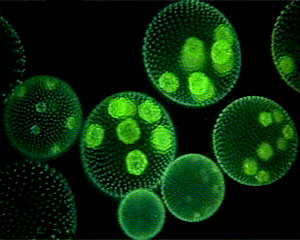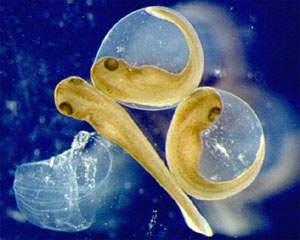Asexual vs Sexual Reproduction
It seems so obvious that having two sexes necessary for reproduction is more advantageous than just cloning. Recombination-the swapping of parts of chromosomes during meiosis which produces 4 cells with a mixture of genetic material from the organism's parents-should lead to more variation in organisms, thus insuring survival of the species. Those organisms without this ability, or the ability to mate and combine two sets of genetic material into one, seem destined for failure, because of their lack of this perceived variation. However, when scrutinized, this advantage for sexual organisms seems less and less advantageous. In fact, the question today is not, why does cloning still exist, but why does sex exist at all?
Cloning seems to be the most efficient method of reproduction. By producing exact copies of oneself, one insures that all of her genes will pass on undiluted to the next generation. This is obviously better from an individual's perspective because your genetic material is passed down in its exact form, barring mutations. Since natural selection acts on individuals, this means a cloning individual will pass all of her genes to the next generation, and all of those genes that were expressed in her will be expressed in them. If the organism has survived long enough to reproduce in a certain environment, it is more probable that her children will also.
Similarly, an organism doesn't have to waste time and energy finding a mate, which can be exhausting when organisms tend to live far apart or have complex mating rituals. Reproduction is only dependent on how many eggs cloned, which is dependent on the amount of food consumed, and is thus easier on the original organism.
Perhaps the biggest advantage of colonel organisms is that of not having males. In a sexual population, only half is capable of gestation, whereas everyone in a cloning population is. This means that for a given population size, twice as many offspring can be cloned as can be reproduced sexually when the original population of clones are small compared to the population size of sexual organisms. This advantage extends beyond just when the population is increasing in numbers, and is called the, "two-fold advantage," named after the ability to reproduce twice as many organisms by cloning as by sex. Some biologists, and lay people, have misconstrued this idea as the "cost of meiosis." Not much is deleterious about the process of meiosis in sexual organisms, although the time it takes to complete meiosis for a cell could constitute a very small disadvantage. The phrase "cost of meiosis" simply means that in a meiotic division that does not produce 4 viable gametes, some genetic material ends up being lost.
As you have probably gleaned from the text already, there are many costs associated with sexual reproduction. These include, stated above as plusses of cloning, loss of genetic material through fertilization, the necessity of finding a mate, and the cost of having males. This last disadvantage is particularly interesting because the entire cost of creating males is thrown onto females, who gestate and give birth, while all males do, evolutionarily-speaking, is contribute genetic material.
As shown, it is obvious that sex is not as good a method of reproduction for the individual as cloning, but must somehow be advantageous to the whole population since sex is so ubiquitous in higher organisms. The explanation is the group selection hypothesis, whereby a single animal puts itself at risk for the betterment of the group. Joann C. Gutin uses the example of an animal that emits a warning cry whenever it sees a predator, sparing the group, but putting itself in danger. The hypothesis doesn't make many claims and is generally dubious, as first demonstrated by John Maynard Smith in, amongst other pieces of writing, his book The Evolution of Sex.
All this being said, there must be advantages to balance out the disadvantages to sexual reproduction since it exists on a par with cloning. The theories described later in this webpage, and the many others that exist, are an attempt to codify these advantages into a solid reason for the existence of sex. Though many seem rather insignificant alone, taken in tandem they show sex is quite a powerful tool (no pun intended) against viruses, changing environments, and other evolutionary forces.
 
Asexual reproduction (volvox) vs sexual reproduction (tadpoles)
Pictures copyright biodidac.bio.uottawa.ca
|



